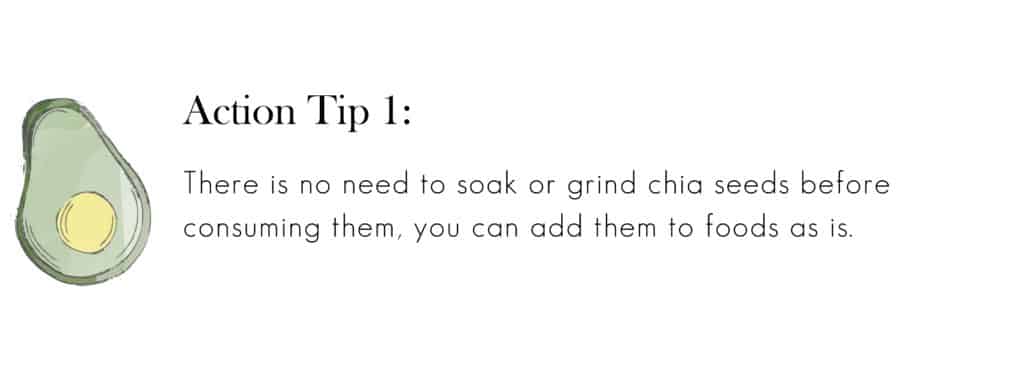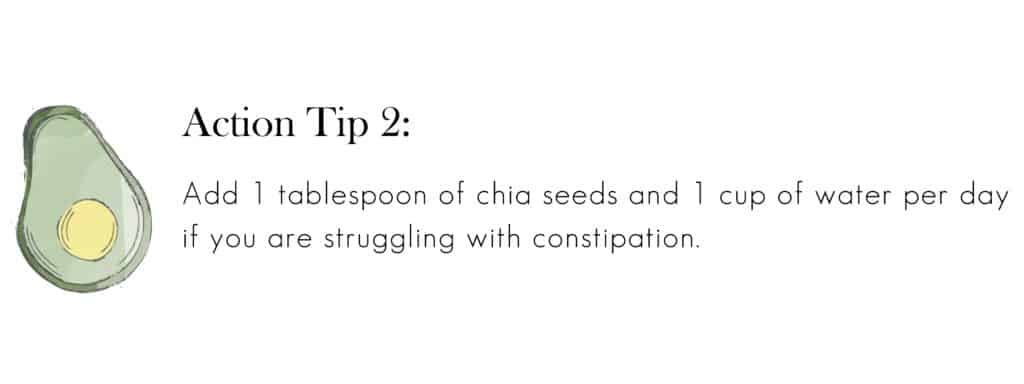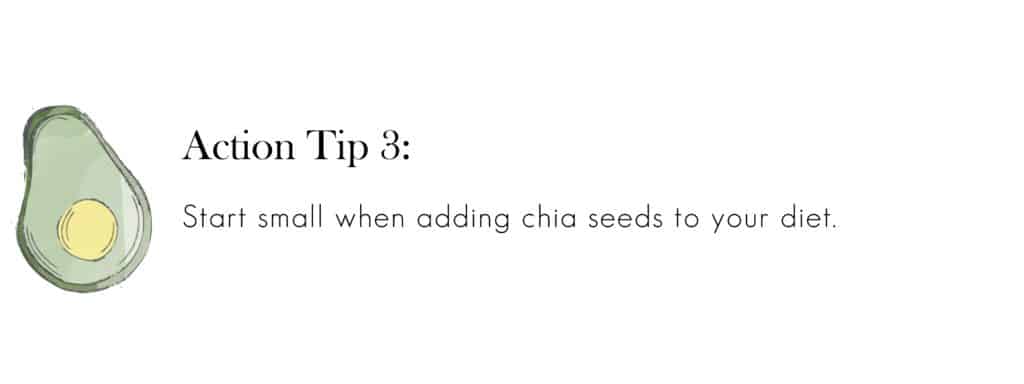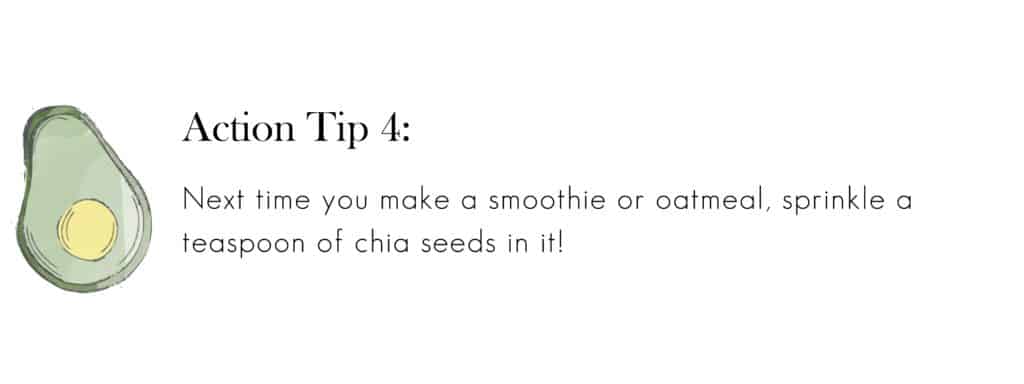Have you been wondering if eating chia seeds while pregnant is beneficial to you and your baby?
Chia seeds come from a desert plant, from the mint family, called Salvia hispanica. You may know them for their dark, black color, and all of the fun recipes that chia can be incorporated into (chia pudding, anyone?).
While pregnant, you’re doing everything you can to make the healthiest choices possible for you and your growing baby. Let’s sort out the facts about chia seeds and pregnancy!
Are chia seeds safe during pregnancy?
Chia seeds are safe to eat during pregnancy and, like many other whole grains and seeds, contain numerous beneficial nutrients for pregnancy, which will be discussed more below.
What food group are chia seeds in?
Chia seeds are unprocessed, whole grains, and are the seed of the flowering plant Salvia hispanica grown in several Latin American countries, as well as Australia. Legend has it that ancient warriors attributed their strength and stamina to this tiny seed (1).
Chia seeds are either white or black in color, but you may be used to seeing the dark chia seeds in your local grocery store. There is no nutritional difference depending on the color of the chia seed, unless it is brown, which means it is not ripe.

They are 9% water, 46% carbohydrate (mostly fiber), 34% fat, and 19% protein (2).
These little seeds pack a plentiful nutrition punch. They are considered to be a complete protein source, which means chia seeds contain all nine essential amino acids (3).
Amino acids are the building blocks for protein, and essential amino acids are so important to obtain from your diet because your body cannot make them.
Protein is important during pregnancy as it helps your baby grow (4). Protein needs vary person to person and your needs continue to increase as you move throughout pregnancy (5).
A woman who weighs around 150 pounds, needs close to 80 grams of protein per day in early pregnancy.
Nutrient breakdown
1 Tablespoon (13 grams) Chia Seeds
Energy: 60 calories
Carbohydrates: 5 g
Fat: 4 g
Protein: 2 g
Fiber: 4 g
Calcium: 80 mg
Iron: 1.08 mg
Cholesterol: 0 g
All values provided by the USDA nutrient database
Benefits of chia seeds during pregnancy
Omega-3 fatty acids
Chia seeds are an excellent source of omega-3 fatty acids, containing 7 grams per 1 tablespoon.
Most of the omega-3 fatty acids in chia seeds are ALA (alpha-linolenic acid), which exerts antioxidant and anti-inflammatory effects (6).
ALA is a type of omega-3 fatty acid, just like DHA, however, they are not equivalent in function.
DHA is a crucial nutrient in the development of your baby’s brain and has been studied quite a bit in relation to cognition after birth (7).
ALA is converted to DHA but at a very poor rate. Therefore, you still need to get DHA in your diet from sources that contain DHA directly, like fish (8).
Most experts agree DHA is the most important omega-3 and we know this is true during pregnancy. But, not to worry, chia seeds have other benefits besides containing high amounts of ALA.
Fiber
Chia seeds contain a unique blend of soluble and insoluble fiber, so they can be beneficial in alleviating pesky gastrointestinal (GI) issues, like constipation.
The high fiber content coupled with protein may even help reduce your risk of developing gestational diabetes (9). With guidance from your dietitian or doctor, chia seeds may also make a great diet addition if you have been diagnosed with gestational diabetes (2).
One study suggests chia seeds can help mitigate the adverse effects a high sugar diet has on our health from during pregnancy to adulthood (10).

Mineral content
Lastly, chia seeds are high in a variety of minerals important for pregnancy such as iron, calcium, magnesium, zinc, and phosphorus.
They also provide a wide variety of antioxidants (2).
Interestingly, chia flour has been shown to increase hemoglobin concentrations in animals (11). Swapping wheat flour for chia flour also increases the fiber content of the product (12).
If you are looking to get creative in the kitchen while also increasing your iron levels, this may be your new favorite ingredient!
Are there risks to eating chia seeds during pregnancy?
Chia seeds are a low-risk food to consume in and outside of pregnancy, but there is one important note to mention.
Some people report GI discomfort when overindulging in chia seeds such as constipation, diarrhea, or general discomfort like bloating. If you do notice any of these symptoms, you can try soaking them prior to consuming them.
Before adding more chia seeds to your diet, consult with your registered dietitian or doctor, especially if you are on any medication.

Next, we will discuss the appropriate portion sizes.
How many should I eat?
Adding 1-2 tablespoons of chia seeds to your diet is a good start. It’s important to increase your water intake due to the fiber content discussed above, however, you do not need to soak them in water or ground them before consuming unless you have a GI condition that warrants this.
If you enjoy chia seeds and tolerate them well, you can add more than the initial 1 tablespoon to your diet a day, but like anything else, moderation is key.
Research shows that eating high amounts of ALA has no adverse effects on pregnant women consuming up to 600 mg of ALA per day (13).
Although keep in mind what we discussed above, you should not be relying on chia seeds for your daily dose of omega-3’s.
How to include chia seeds in your prenatal diet
Chia seeds can virtually be thrown on any food or dish. Even the more involved recipes that use chia seeds are easy and fun to make.

Here are several ways to include chia seeds in your diet:
- Use as a yogurt topping
- Add to smoothies
- Add to oatmeal
- Make chia pudding
- Add to overnight oats
- Add to avocado toast
- Swap regular flour for chia flour
- Have you heard of chia water?
Mix ¼ cup of chia seeds in 4 cups of water. Let it sit for 20-30 minutes, then enjoy. Additionally, you can add some chopped fruit to give it a flavorful addition.
The Bottom Line
- While there isn’t a lot of research on chia seeds while pregnant, the general consensus is that consuming chia seeds during pregnancy is safe, and even beneficial to a growing baby.
- Chia seeds do contain omega-3’s but even better is their high fiber and mineral content.
- Adding them to your diet may even help balance your blood sugars and decrease your chance of developing gestational diabetes.
- If you want to start adding them to your prenatal diet, there are many recipes you can try such as chia pudding or simply adding them to your smoothie.
- It may take some time to get used to the flavor and texture of chia seeds, but it’s well worth it for all of the powerful benefits these tiny seeds provide.
By Alexa D’ Orazio, MS, RDN and Ryann Kipping, MPH, RDN, CLEC | Owner & Founder

